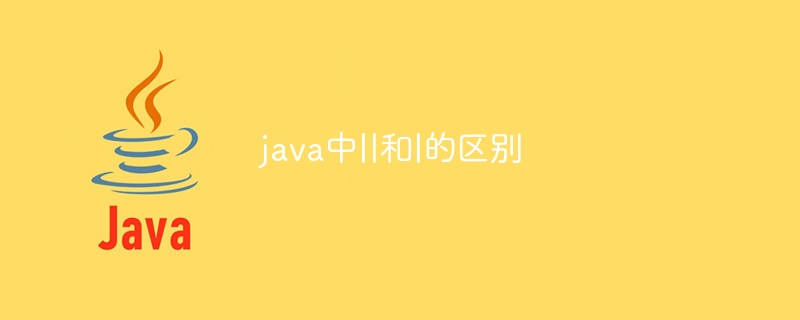The difference between || and | in java
|| and | in Java are logical operators used to connect two Boolean values. || has higher priority (logical OR), evaluates from left to right, and stops evaluation immediately if the first operand is true. Whereas | has lower precedence (bitwise OR), each operand is evaluated bitwise, and if the corresponding bit of any operand is 1, then that bit of the result is also 1.

The difference between || and | operators in Java
Brief description:
| and | in Java are both logical operators used to connect two Boolean values, but they have different priorities and evaluation rules.
Details:
-
Priority:
- || has priority (14), while | has lower priority (13).
-
Evaluation rules:
-
##|| (Logical OR):
- Evaluate operands from left to right.
- If the first operand is true, the result is true and evaluation stops immediately.
- Otherwise, continue to evaluate the second operand, and the result is its value.
-
| (Bitwise OR):
- Regardless of the order of the operands, execute each operand separately Bitwise operations.
- For each bit, if the bit of any operand is 1, then the bit of the result is also 1. Otherwise, this bit in the result is 0.
-
Example:
-
|| (logical OR) :
In the first example, since the first operand is true, the || operator immediately evaluates to true without executing the second operand.<code>boolean result = true || false; // 结果为 true System.out.println(result);</code>
Copy after login -
| (Bitwise OR):
In the second example, the | operator's binary representation of each operand Performs a bitwise OR operation, producing the result 11 (3 in decimal).<code>int result = 1 | 2; // 结果为 3(01 | 10 = 11) System.out.println(result);</code>
Copy after login
Conclusion: || and | operators are used to concatenate Boolean values, but have different precedence and evaluation rules. Use || when you need to logically join conditions, and | when you need to perform bitwise operations.
The above is the detailed content of The difference between || and | in java. For more information, please follow other related articles on the PHP Chinese website!

Hot AI Tools

Undresser.AI Undress
AI-powered app for creating realistic nude photos

AI Clothes Remover
Online AI tool for removing clothes from photos.

Undress AI Tool
Undress images for free

Clothoff.io
AI clothes remover

AI Hentai Generator
Generate AI Hentai for free.

Hot Article

Hot Tools

Notepad++7.3.1
Easy-to-use and free code editor

SublimeText3 Chinese version
Chinese version, very easy to use

Zend Studio 13.0.1
Powerful PHP integrated development environment

Dreamweaver CS6
Visual web development tools

SublimeText3 Mac version
God-level code editing software (SublimeText3)

Hot Topics
 1377
1377
 52
52
 How does Java's classloading mechanism work, including different classloaders and their delegation models?
Mar 17, 2025 pm 05:35 PM
How does Java's classloading mechanism work, including different classloaders and their delegation models?
Mar 17, 2025 pm 05:35 PM
Java's classloading involves loading, linking, and initializing classes using a hierarchical system with Bootstrap, Extension, and Application classloaders. The parent delegation model ensures core classes are loaded first, affecting custom class loa
 How do I implement multi-level caching in Java applications using libraries like Caffeine or Guava Cache?
Mar 17, 2025 pm 05:44 PM
How do I implement multi-level caching in Java applications using libraries like Caffeine or Guava Cache?
Mar 17, 2025 pm 05:44 PM
The article discusses implementing multi-level caching in Java using Caffeine and Guava Cache to enhance application performance. It covers setup, integration, and performance benefits, along with configuration and eviction policy management best pra
 How can I use JPA (Java Persistence API) for object-relational mapping with advanced features like caching and lazy loading?
Mar 17, 2025 pm 05:43 PM
How can I use JPA (Java Persistence API) for object-relational mapping with advanced features like caching and lazy loading?
Mar 17, 2025 pm 05:43 PM
The article discusses using JPA for object-relational mapping with advanced features like caching and lazy loading. It covers setup, entity mapping, and best practices for optimizing performance while highlighting potential pitfalls.[159 characters]
 How do I use Maven or Gradle for advanced Java project management, build automation, and dependency resolution?
Mar 17, 2025 pm 05:46 PM
How do I use Maven or Gradle for advanced Java project management, build automation, and dependency resolution?
Mar 17, 2025 pm 05:46 PM
The article discusses using Maven and Gradle for Java project management, build automation, and dependency resolution, comparing their approaches and optimization strategies.
 How do I create and use custom Java libraries (JAR files) with proper versioning and dependency management?
Mar 17, 2025 pm 05:45 PM
How do I create and use custom Java libraries (JAR files) with proper versioning and dependency management?
Mar 17, 2025 pm 05:45 PM
The article discusses creating and using custom Java libraries (JAR files) with proper versioning and dependency management, using tools like Maven and Gradle.




